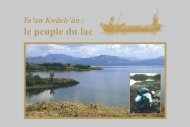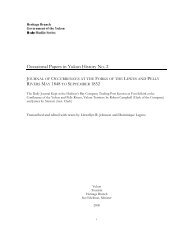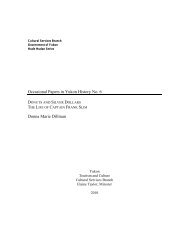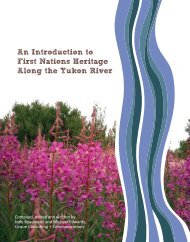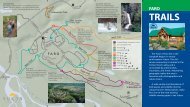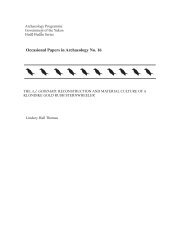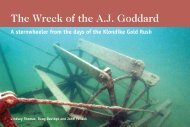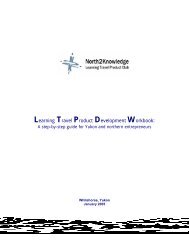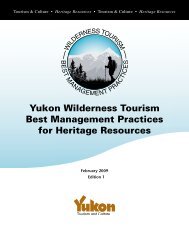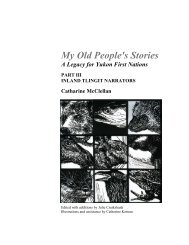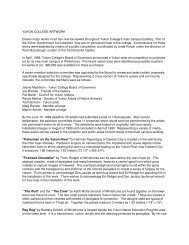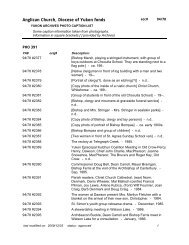Sustainable Tourism: The Tour Operators' Contribution
Sustainable Tourism: The Tour Operators' Contribution
Sustainable Tourism: The Tour Operators' Contribution
You also want an ePaper? Increase the reach of your titles
YUMPU automatically turns print PDFs into web optimized ePapers that Google loves.
4.3 Discovery Initiatives:<br />
Holiday Programmes that Support Local<br />
Development and Conservation<br />
Description of Good Practice<br />
Discovery Initiatives, a UK-based outbound nature tour operator, offers<br />
holidays and tours that support wildlife and conservation. <strong>Tour</strong> design is<br />
therefore a crucial step in the company’s sustainability strategy.<br />
<strong>The</strong> three key holiday types offered by Discovery Initiatives are:<br />
• Footprint Holidays that ‘don’t cost the Earth’ are relaxing or special interest tours that use organisations,<br />
operations or accommodations which make an active contribution to their local communities and their<br />
environment, and encourage fair trade. For example, a walking tour of Dominica, in the Caribbean, offers<br />
a chance to go off the beaten track to little-visited parts of the island and stay in all locally owned hotels<br />
and lodges.<br />
• Insight Holidays allow individuals or small groups of holidaymakers to experience and gain a privileged<br />
insight into wildlife or communities as part of an overall holiday itinerary. For example, in Namibia, tours<br />
visit community wildlife conservation initiatives run by local people and contribute $350 per client to these<br />
programmes.<br />
• Discoverer Holidays allow individual holidaymakers to get actively involved as field assistants in specific<br />
research. For example, a tour in Kalimantan, Indonesia, on the island of Borneo, allows travellers to work<br />
with the leading orang-utan study programme in the world and contributes $1,000 per client to the Orangutan<br />
Foundation in Tanjing Putung National Park.<br />
<strong>The</strong>se holiday programmes are designed to use tourism as economic leverage with local communities, to<br />
support them in protecting their environment and culture. Each programme is designed to fulfill a number of<br />
strategic objectives, including:<br />
• Promoting sustainable tourism;<br />
• Supporting conservation efforts;<br />
• Making financial contributions to wildlife and<br />
development agencies and conservation initiatives;<br />
• Raising awareness about conservation issues; and<br />
• Ensuring that the benefits of the tour programmes<br />
stay in the host countries.<br />
<strong>The</strong> holidays are based on partnerships that increase<br />
awareness and encourage grassroots environmental<br />
action, offering a method of supporting small-scale and<br />
local community projects in a sustainable and proactive<br />
way. At the same time, tourists get practical opportunities<br />
to experience or become actively involved in<br />
projects that deliver credible outputs and to see and<br />
understand ecological or development issues that are<br />
of interest to them.<br />
<strong>The</strong> holiday programmes generate funds directly (through fees paid by the participants) and indirectly (through<br />
increased membership and interest in co-operating organisations, legacies and other fund-raising opportunities).<br />
<strong>The</strong> design of the holiday programmes in the three categories relies mainly on calls for proposals to be<br />
submitted by non-governmental organisations, international agencies or local tour operators. Proposals can<br />
be submitted for holiday programmes or research projects.<br />
<strong>Sustainable</strong> <strong><strong>Tour</strong>ism</strong>: <strong>The</strong> <strong>Tour</strong> Operators’ <strong>Contribution</strong><br />
commuNity trackers<br />
4. Product Management and Development




